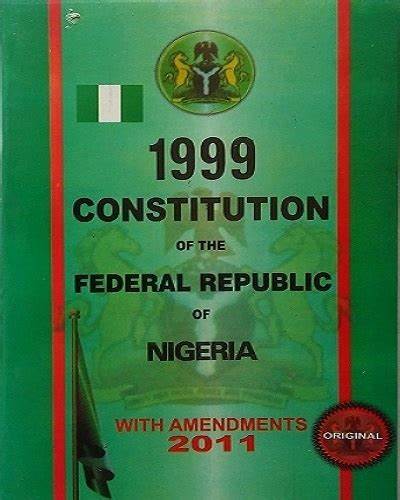1999 Constitution of the Federal Republic of Nigeria
The 1999 Constitution of the Federal Republic of Nigeria is the supreme law that governs the Federal Republic of Nigeria. It was enacted on May 29, 1999, following the transition to civilian rule after years of military dictatorship. The constitution provides the legal framework for the organization, operation, and governance of the Nigerian state.
Description
The 1999 Constitution of the Federal Republic of Nigeria is the supreme law that governs the Federal Republic of Nigeria. It was enacted on May 29, 1999, following the transition to civilian rule after years of military dictatorship. The constitution provides the legal framework for the organization, operation, and governance of the Nigerian state.
Key features of the 1999 Constitution of Nigeria include:
1. Preamble: The constitution begins with a preamble that outlines the aspirations and objectives of the Nigerian people, including the desire for unity, peace, and progress.
2. Fundamental Rights: The constitution guarantees fundamental rights and freedoms to all Nigerian citizens, including the right to life, liberty, and security of person, freedom of expression, freedom of association, and the right to a fair trial.
3. Structure of Government: The constitution establishes the three branches of government: the executive, legislative, and judicial branches. It defines the powers and functions of each branch and establishes the principle of separation of powers.
4. Federal System: Nigeria operates as a federal system of government, with powers divided between the federal government and the state governments. The constitution delineates the powers and responsibilities of the federal and state governments, as well as the relationship between them.
5. Citizenship: The constitution defines who is considered a Nigerian citizen and outlines the rights and responsibilities of citizenship.
6. Electoral System: The constitution establishes the framework for elections and the electoral process in Nigeria, including the establishment of the Independent National Electoral Commission (INEC) to oversee elections.
7. Amendment Procedure: The constitution provides a procedure for amending its provisions, outlining the process by which amendments can be proposed and ratified.
The 1999 Constitution of Nigeria has been amended several times since its enactment, reflecting changes in the country’s political, social, and economic landscape. It serves as the foundation of Nigeria’s democratic system and the basis for the rule of law in the country.



Reviews
There are no reviews yet.